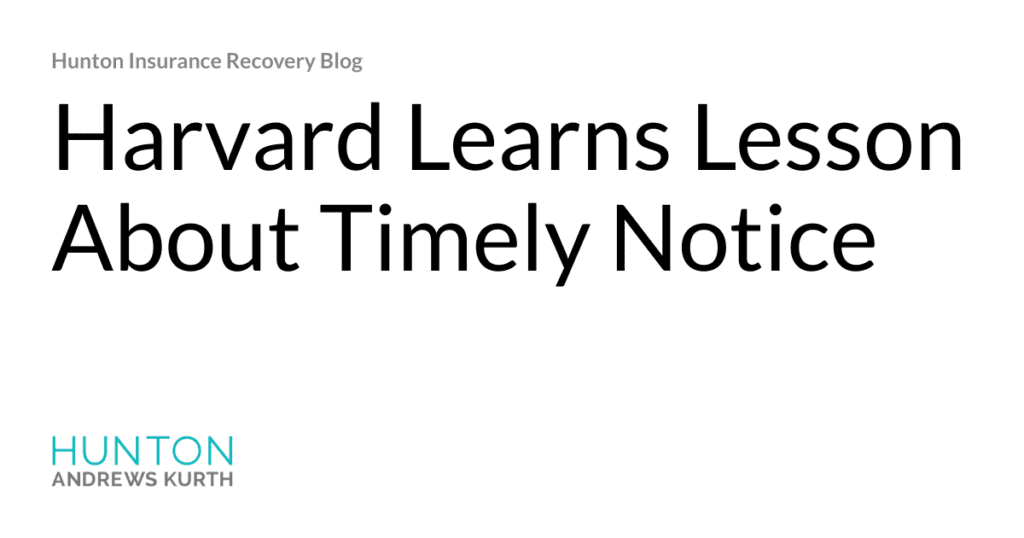Harvard Learns Lesson About Timely Notice

While Harvard prepares to defend its admissions policies to the Supreme Court, one of its insurers continues to argue that a technicality prevents Harvard from recovering $15 million to defray its defense costs under its insurance policies.
Last month, we discussed an insurance coverage dispute between Harvard College and Zurich American Insurance Company. The dispute arises from Zurich’s refusal to cover a 2014 lawsuit that an affirmative-action group filed against Harvard, alleging that the university’s admissions policies violated Title VI of the Civil Rights Act. Since the affirmative action suit was filed, Harvard has been defending its admissions policies through the trial and appellate court systems, an effort that has cost the university more than $25 million.
Zurich is refusing to provide Harvard the $15 million in excess insurance coverage it sold to the university for costs over and above the $25 million Harvard’s primary insurer promised to pay. Harvard wants that $15 million to pay for its ongoing defense costs or to resolve the claims against it. But, after Harvard notified Zurich that its excess insurance policy was about to be on the hook, Zurich denied coverage, claiming that Harvard’s failure to comply with the excess insurance policy’s notice requirements barred coverage. In 2021, Harvard sued Zurich to recover the $15 million it is owed under the excess insurance policy.
In August, Zurich moved for summary judgment, arguing that the issue is easy: No timely notice, no coverage.
More specifically, Zurich argues that Harvard missed the deadline to give notice by more than a year, and that mistake completely bars coverage. The Zurich excess policy is a “claims-made and reported policy,” meaning that it extends coverage only to claims both made against the policyholder (Harvard) and reported to the insurer (Zurich) during the term of the policy or within a 90-day grace period afterward. According to Zurich, the only fact the court needs to consider is that Harvard missed the notice deadline.
Harvard, on the other hand, argues that Zurich is being too literal, and is playing a “cat and mouse” game to avoid paying exactly what it promised when it sold Harvard the excess insurance policy. According to Harvard, Zurich knew about the affirmative action litigation even though Harvard had not formally given notice, would not have done anything differently if Harvard had given notice earlier, and should not be allowed to rely on a technicality to avoid paying. In Harvard’s words, the “notice requirement is not an escape hatch for insurance companies to avoid liability to policyholders due to technical noncompliance.”
Harvard’s argument makes sense. Why should an insurance company that actually knows what’s going on be permitted to take advantage of a notice technicality? Unfortunately, the stark reality is that many, if not most, courts will strictly enforce notice requirements even where the purpose of the provision – informing the insurer about the claim – was met. So, Harvard’s dispute serves as a lesson to all policyholders: Don’t hit snooze on your notice obligation. Policyholders should carefully review their insurance policies and give timely notice of any and all potential claims. Better to over notify their insurers than to get caught in a cat and mouse game.







